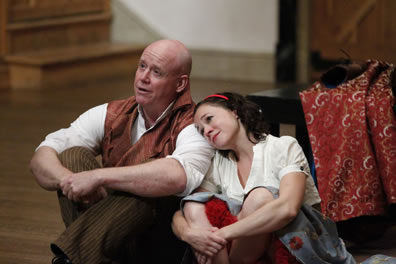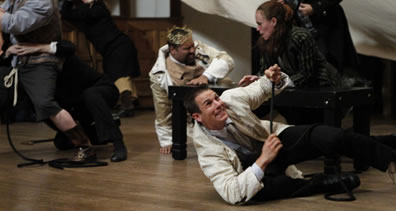The Tempest
Fatherhood, Freedom, and Drag Queens
American Shakespeare Center, Blackfriars Playhouse, Staunton, Va.
Saturday, October 8, 2011, D–7&8 (middle stalls)
Directed by Jim Warre
A friend of ours mentioned that he had been given tickets to see this ASC production of The Tempest. “I was expecting it to be somber—but it wasn’t,” he said. No, it was Juno, Circe, and Iris appearing as drag queens, hip-undulating, “ah-ooooooh”-singing, boa-swishing drag queens. Even though two of them wore beards they looked mighty fine, too, I must admit. Oh, and they did use Shakespeare’s verse, set to original music played on the guitar by Ariel.

James Keegan as Prospero tells Miranda (Miriam Donaldson) his history as sometime Duke of Milan in the American Shakespeare Center's production of The Tempest at the Blackfriars Playhouse. (Photo by Tommy Thompson, American Shakespeare Center.)
I’ll leave for a future commentary why people have come to expect Shakespeare’s comedies to be “somber.” For now, I’ll just address why drag queens performed the lovers' pageant in this Tempest. Well, actually, I really can't address that other than to say the audience was howling in laughter. It was one of a couple of over-the-top comic moments juxtaposed against keen textual insights and some of the best verse-speaking you’ll hear anywhere.
One minute the crowd—as has become the norm at this theater, half comprising college-age adults, the rest represented by all other ages, from 8 to 80—was hooting and hollering at the pageant and Prospero (James Keegan) doing the bump with Juno (Benjamin Curns). A minute later the crowd was hanging on every heartfelt, soul-sounding syllable of that same Prospero’s “We are such stuff as dreams are made on” speech. Two scenes earlier, we were moved to tears as Curns’ Caliban spoke of the music of the isle, then seconds later we were clapping along to Caliban, Stephano, and Trinculo singing “Ban Ban Caliban” as they stomped around the stage in a rumba dance and exited with Shakespeare’s closing line of “Freedom High-Day!” segueing into Aretha Franklin’s “Think (Freedom).”
Because of the Blackfriar’s stage-it-like-the-Kings-Men conditions, The Tempest offered us a rare opportunity to see a magical pageant as Shakespeare might have actually envisioned it in his own theaters. I’m guessing he didn’t envision a bump-and-grind drag show (I am guessing he might have joined us in laughing, though). While Warren played the pageant purely for laughs, the tempest itself was an example of effective Shakespeare-era staging sans electronics, lights, computers, and flying sets. The actors on stage, struggling with ropes hung over the balconies, shouted over the wind and rain vocalized by actors off stage. A huge sail hung over the back of the stage, billowed this way and that as managed by one of the seamen in “the topmast.” Physical acting—the players appearing to be losing their grip on the ropes and being heaved across the stage by the pitching ship (much more realistically than Kirk, Spock and company ever did on the bridge of the Enterprise)—put us in an honest-to-goodness storm.
Then confusion ceased and the sail fell down to reveal Prospero, standing staff in hand as Miranda (Miriam Donaldson) ran forward in concern for the brave ship. This first impression of Prospero was one of a tyrant. However, Keegan and Miriam thereafter emphasized Prospero’s role as a father first and foremost. He doted on her, she idealized him, and this served as the play's core. Though the tyrant bubbled just under the surface of Keegan’s portrayal—and this was a man who, though he said he loved his books above his dukedom, clearly enjoyed the trappings and authority that come with rule—it was his care for his daughter that drove his actions toward Ferdinand, Naples, and even Caliban.
Gregory Jon Phelps’ lithe portrayal of Ariel revealed many new dimensions to this spirit. He, like Caliban, had a deep fondness for Miranda (unrequited, of course, because she doesn’t even know he exists). Every time Prospero mentioned he would be free, Ariel grinned like a Labrador retriever seeing its master taking a jacket and leash out of the closet. Then his expression and posture sank to disappointment when Prospero gave him yet another order. On the other hand, just mentioning the name of Sycorex caused Ariel to flinch in memorial pain.

Patrick Midgley as Ferdinand grapples with a ship's rope as the King of Naples (René Thornton Jr.), Sebastian (Blythe Coons), and the rest of the king's company and crew struggle to maintain their footing on the pitching ship during the tempest in The Tempest at the American Shakespeare Center's Blackfriars Playhouse. The actors used miming skills, movement, and vocalized sound effects to convey the rough seas and howling winds that lead to their suppose shipwreck. (Photo by Tommy Thompson, American Shakespeare Center).
These threads wound together in the scene of Caliban convincing Stephano (Chris Johnston) and Trinculo (Allison Glenzer) to overthrow Prospero. Talk of the plot gave Ariel pause, and the notion of freedom that had inspired a happy grin otherwise now elicited a sneer in the airy spirit as he considered joining in the plot. But Ariel came off this ledge when Caliban suggested that Stephano could have Miranda among the rewards for killing Prospero, and when Caliban mentioned his mother, Sycorex, it not only incited Ariel’s physical tick but also turned him inexorably against the three plotters. Later, at the moment of his freedom, Ariel didn’t grin. He looked shocked. Prospero kissed him on the forehead, Ariel fell to his knees, sounding as if he were crying, but then he leaped up and ran off the stage laughing hysterically.
The ASC is deep in acting talent, and so every part was adeptly played. But a particular shoutout goes to Patrick Midgley as Ferdinand, yet another solid performance by an actor who, on this weekend, we saw give a memorable performance in the unmemorable role of Theridamas in Tamburlaine the Great and virtually dominate Henry V playing the Dauphin as well as Captain MacMorris and the soldier Michael Williams. Midgley is a body builder, and that fact was a central point as the shirtless Ferdinand carried logs in front of a smitten Miranda (not to mention smitten women—and others, too, no doubt—in the audience whose hearts set to palpating, especially when he directly addressed them). It also led to a joke vis á vis the strong man and the weak maid we could see coming from miles away but, nevertheless, inspired applause from the house.
“Applause from the house.” There was a lot of that. Almost every character’s exit inspired clapping, something we’ve seldom heard in any Shakespeare production. Nope, there was nothing at all somber happening in this play. Yet, there were plenty of deep thoughts and heart-stirring moments of Shakespearean brilliance.
Eric Minton
October 12, 2011
Comment: e-mail editorial@shakespeareances.com
Start a discussion in the Bardroom



 Find additional Shakespeareances
Find additional Shakespeareances